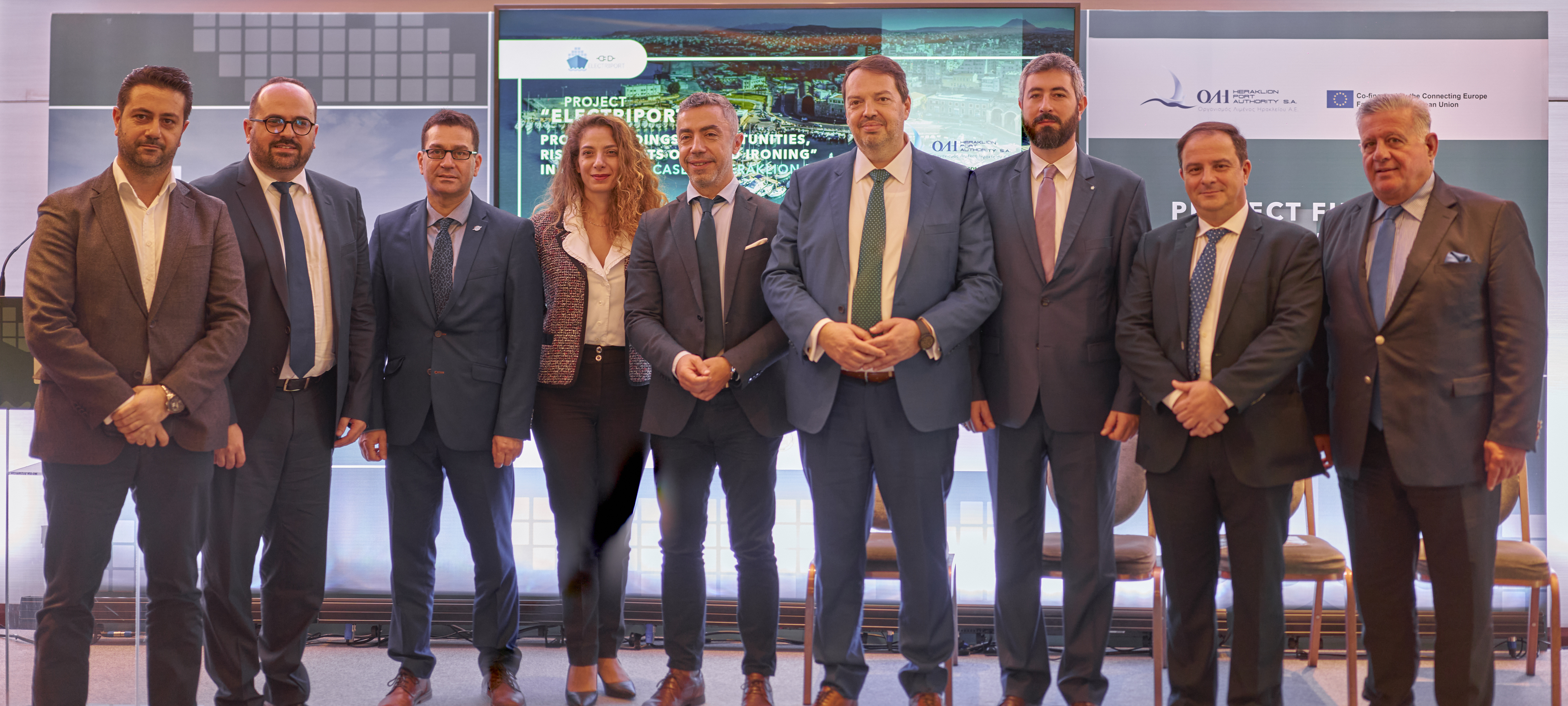An ambitious development project concerning ship electrification plans that will transform the port of Heraklion into a green Port with the creation of ship electrification facilities (Cold Ironing), was presented at the Conference: " PROJECT FINDINGS, OPPORTUNITIES, RISKS & THREATS OF “COLD IRONING” IN PORTS ", held on Saturday, December 10th, at the Athens Marriott Hotel. ELECTRIPORT, is co-financed by the Connecting Europe Facility of the European Union, with the aim of conducting detailed analysis of energy needs and completes its Studies by delivering the results within the next three months.
The project reduces the environmental footprint of ships with high energy needs such as cruise ships, while simultaneously upgrading and modernizing the port facilities, through energy transformation and shift to “green” forms of energy.
In his speech, the CEO of Heraklion Port Authority S.A., Mr. Minas Papadakis, emphasized the dramatic consequences of climate change that many countries on the planet experience and pointed out the need for immediate action to be taken for drastically reducing the greenhouse gas emissions, which will contribute to the reduction of air pollution in the city of Heraklion and will lead a pilot project for the development of other similar projects in port cities.
Mr. Minas Papadakis, also, stated in his presentation that the strategies for a "smart" port of the future, are taking shape in the port of Heraklion. The application and installation of cold ironing in the port of Heraklion reduces the environmental footprint of the ships while at the same time it upgrades and modernizes the port facilities. This course increases the competitiveness of the port of Heraklion by attracting investors while the resale of the electric energy will not only have a financial benefit for the Heraklion Port Authority, but also for the ships being supplied.
Despite any problems and difficulties such as the cost of transition, the required power being secured, the pricing of the provided energy and the sustainability of the investment, the timing of the implementation of the project is considered great, due to the interconnection of Crete with the electricity network of the mainland of Greece, which makes the development of Cold ironing facilities at the port of Heraklion sustainable and technically feasible.
Mr. Papadakis presented a map that reflected the electrification systems in European ports, where the absence of such activity in the countries of Southern Europe was evident in relation to the countries of the Northern region where the electrification systems have been already evolving already for 20 years. Mrs. Maria Deligiannis, the National Director of the Eastern Mediterranean Cruise Lined International Association (CLIA), also focused on that point, stating only 29 ports in the world have Cold ironing.
The weaknesses of the electrical networks in supporting ports, are one of the causes of the general delay of the cold ironing programs internationally with Mr. Manolis Koutoulakis, the General Secretary for Insular Policy and Aegean, stating that the project NEARCHOS for the financing of green island and port infrastructures will begin to be implemented from the beginning of 2023.
In addition, the progress of the implementation of the project was presented by the rest of the project partners, while a conversation took place with the attendees and many questions were answered regarding the Cold ironing technology.
The partnership of the ELECTRIPORT project consists of:
Heraklion Port Authority S.A., Lead Partner
Wartsilla Hellas
Premium Consulting
BMG Marine – Electromechanical Engineers,
Hellenic Mediterranean University (ELMEPA)
ANELIXIS Development Consultants S.A
MSI Hellas, Private Security Company
National Technical University of Athens
The ELECTRIPORT project, through the holding of the Conference, created an open platform for dialogue and for techno – information exchange, where the technical limitations, the effectiveness of the installation at the port as well as the feasibility and effectiveness of the whole project were thoroughly examined. Dimensions such as the economic aspect, the pricing models, the private and social surplus that are linked to the elimination of harmful gases and substances were processed and in general, the final results reflected as many views and aspects as possible regarding Cold ironing.
